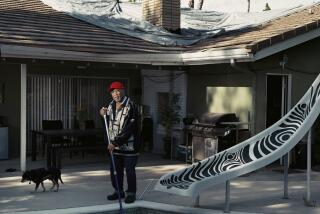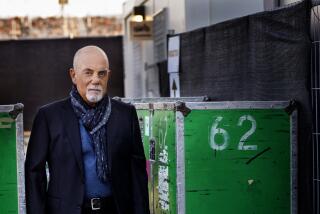O.C. POP MUSIC REVIEW : Socialist Singer Fares Better Than Ideology : Billy Bragg’s politics, springing--as they do--from compassion more than anything else, maintain their relevance.
- Share via
SAN JUAN CAPISTRANO — How does a socialist folk singer fare at a time when world socialism is in upheaval? Quite well, thank you, in the case of British Billy Bragg. His nearly 2 1/2-hour performance at the Coach House on Sunday found him not only still manning the barricades but dancing nimbly atop them.
Bragg’s brand of socialism, like that of his sister-in-arms Michele Shocked, springs more from compassion than a concrete ideology, and the thrust of his performance was to convey the spirit of his beliefs in world change with a very human emotion and wit. (Among flashes of the latter, he discussed the ways musicians warm up for their gigs, asserting, “I used to be rubbed down with a copy of ‘Das Capital.’ ”)
Minus the piano accompanist who usually tours with him, Bragg composed the set from his older guitar-based tunes and a wealth of new, unrecorded songs.
There was a goodsome offering of his fist-wavers, including “There Is Power in a Union” and his 1986 “Help Save the Youth of America,” which was updated to include the current Gulf crisis while retaining the same tag line: “You can fight for democracy at home / Not in some foreign land.”
He offered up his “The Marching Song of the Covert Battalions”--a song from his current “The Internationale” EP attacking U.S. interference in Central America--as a possible new national anthem.
He likes parts of our old one, noting how cute and friendly he finds “any anthem that begins ‘Oh say ,’ ” but as a Britisher, he said, he finds the “rockets’ red glare” part tantamount to us having to endure another nation’s song going “Kill, kill the Americans.”
Balancing his political material were such numbers as “Levi Stubbs’ Tears,” “Richard” and “A New England” dealing movingly with love or its lack.
Introducing that last song, he said he thinks all his material is related, as he views his socialism as an expansion of being able “to love somebody with all your heart.”
Among his new, unrecorded songs were “Tank Park Salute”; “The Few,” attacking British soccer jingoism; and “North Sea Bubble,” about a Britain isolated in a changing world. The most affecting of his new material was the encore offering, “Trust,” a harrowing song about the elevated importance of honesty and love in the age of AIDS.
However much Bragg might have railed at militarism, “Rambo” morality and such, the chief enemy of his performance was time.
Considering that he was preaching to the converted, far too much time was devoted to explaining his positions--”a manifestation of what we call Rambling Bill Bragg,” as he called it--rather than expressing them through his art.
He repeatedly stated a desire to provoke and inspire his audience--at which he might have been more successful were his talents better focused. And as affecting as Bragg often was, even a folkie saint like Phil Ochs ultimately would have been over-diluted by such a lengthy performance.
More to Read
The biggest entertainment stories
Get our big stories about Hollywood, film, television, music, arts, culture and more right in your inbox as soon as they publish.
You may occasionally receive promotional content from the Los Angeles Times.










